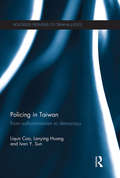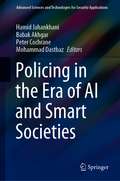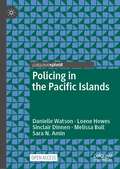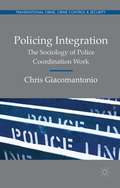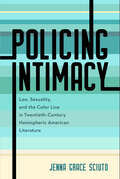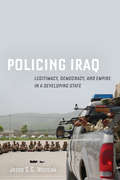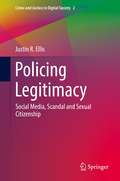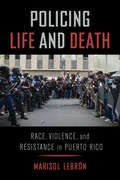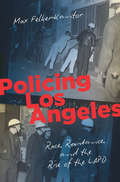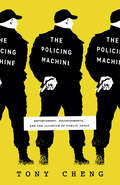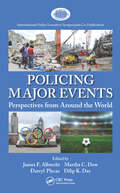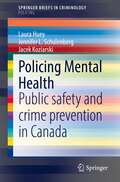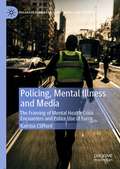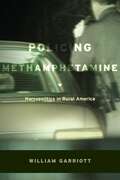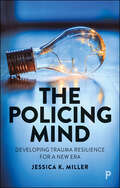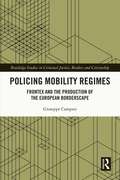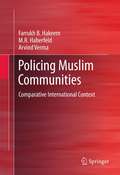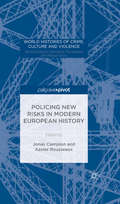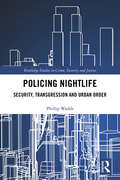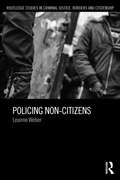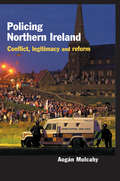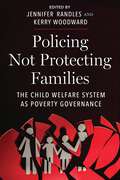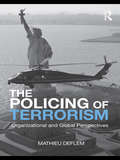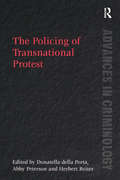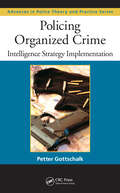- Table View
- List View
Policing in Taiwan: From authoritarianism to democracy (Routledge Frontiers of Criminal Justice)
by Ivan Y. Sun Liqun Cao Lanying HuangThe police in Taiwan played a critical role in the largely peaceful transition from an authoritarian regime to a democracy. While the temptation to intervene in domestic politics was great, the top-down pressure to maintain a neutral standing facilitated an orderly regime change. This is the first monograph to examine the role of the police as a linkage between the state and civil society during the democratic transition and the role of the police in contemporary Taiwan. Starting with a brief history of Taiwan, this book examines the development of policing in Taiwan from a comparative, environmental, historical, operational, philosophical and political perspective; considers the role of the police in the democratic transition; and draws comparisons between police cultures in the East and in the West – both now and in the past. Taiwan operates as a modern country within an East Asian culture and this book shows that Taiwan’s move towards democracy may have political ramifications for the rest of the nations in the area. Including references to literature on policing in China and the U.S, this book about Taiwan police may serve as a springboard for academics and students to learn about similar cultures in this important area of the world. Policing in Taiwan will be of interest to academics and students who are engaged in the study of criminology, criminal justice, policing studies and Asian studies, as well as the general reader.
Policing in the Era of AI and Smart Societies (Advanced Sciences and Technologies for Security Applications)
by Babak Akhgar Hamid Jahankhani Mohammad Dastbaz Peter CochraneThis book presents a compilation of collaborations between researchers and practitioners in the fields of policing and cyber criminology, IT law and security, providing a comprehensive overview of current and emerging challenges in law enforcement, AI and Digital Society. The advent of Artificial Intelligence (AI), together with the spread of Internet of Things (IoT) devices, is creating smart societies that are increasingly interconnected. The scope of connectivity, massive rise in the volume of smart devices and growing interfaces between humans and technology, together with the expansion of Big Data and volumetric metadata generated and collated, are driving the cultural change toward Industry 4.0. Therefore, in light of do-it-yourself biohackers trying to become cyborgs, Augmented Humanity (fusion between humans and technology), governments’ utilization of the various technologies (example eHealth), holographic communications, smart cities / smart societies, cryptocurrencies etc., in the era of Industry 4.0 with AI at its core, enhancing their policing models has become a priority for governments. As the patterns of crime, policy and technology are changing in line with smart societies, law enforcement agencies around the world are called upon to formulate future-ready legislative frameworks, rethink crime prevention, investigatory decision making and predictive policing, prevent or mitigate potentially devastating cyber-attacks, and ensure the security of operational capabilities, namely: Command, Control, Communications and Intelligence (C3I).
Policing in the Pacific Islands (Palgrave's Critical Policing Studies)
by Danielle Watson Loene Howes Sinclair Dinnen Melissa Bull Sara N. AminThis open access book brings together insights into Pacific policing, conceptualising policing broadly as order maintenance involving the actions of multiple local, regional and international actors with sometimes competing and conflicting agendas. A complex and multifaceted endeavour, scholarship on this topic is relatively scarce and widely dispersed across diverse sources. It examines how Pacific policing is shaped by changing state-society relations in different national contexts and ongoing processes of globalisation. Particular attention is given to the plural character of Pacific policing, profound challenges of gender equity, changing dynamics of crime, and the prominence of transnational policing in resource and capacity constrained domestic environments. The authors draw on examples from across the Pacific islands to provide a nuanced and contextualised account of policing in this socially diverse and rapidly transforming region.
Policing Integration: The Sociology of Police Coordination Work
by Chris GiacomantonioThis book critically examines coordination work between police officers and agencies. Police work requires constant interaction between police forces and units within those forces, yet the process by which police work with one another is not well understood by sociologists or practitioners. At the same time, the increasing inter-dependence between police forces raises a wide set of questions about how police should act and how they can be held accountable when locally-based police officers work in or with multiple jurisdictions. This rearrangement of resources creates important issues of governance, which this book addresses through an inductive account of policing in practice. Policing Integration builds on extensive fieldwork in a multi-jurisdictional environment in Canada alongside a detailed review of ongoing research and debates. In doing so, this book presents important theoretical principles and empirical evidence on how and why police choose to work across boundaries or create barriers between one another.
Policing Intimacy: Law, Sexuality, and the Color Line in Twentieth-Century Hemispheric American Literature
by Jenna Grace SciutoIn Policing Intimacy: Law, Sexuality, and the Color Line in Twentieth-Century Hemispheric American Literature, author Jenna Grace Sciuto analyzes literary depictions of sexual policing of the color line across multiple spaces with diverse colonial histories: Mississippi through William Faulkner’s work, Louisiana through Ernest Gaines’s novels, Haiti through the work of Marie Chauvet and Edwidge Danticat, and the Dominican Republic through writing by Julia Alvarez, Junot Díaz, and Nelly Rosario. This literature exposes the continuing coloniality that links depictions of US democracy with Caribbean dictatorships in the twentieth century, revealing a set of interrelated features characterizing the transformation of colonial forms of racial and sexual control into neocolonial reconfigurations. A result of systemic inequality and large-scale historical events, the patterns explored herein reveal the ways in which private relations can reflect national occurrences and the intimate can be brought under public scrutiny. Acknowledging the widespread effects of racial and sexual policing that persist in current legal, economic, and political infrastructures across the circum-Caribbean can in turn bring to light permutations of resistance to the violent discriminations of the status quo. By drawing on colonial documents, such as early law systems like the 1685 French Code Noir instated in Haiti, the 1724 Code Noir in Louisiana, and the 1865 Black Code in Mississippi, in tandem with examples from twentieth-century literature, Policing Intimacy humanizes the effects of legal histories and leaves space for local particularities. By focusing on literary texts and variances in form and aesthetics, Sciuto demonstrates the necessity of incorporating multiple stories, histories, and traumas into accounts of the past.
Policing Iraq: Legitimacy, Democracy, and Empire in a Developing State
by Jesse WozniakPolicing Iraq chronicles the efforts of the Kurdistan Regional Government of Iraq to rebuild their police force and criminal justice system in the wake of the US invasion. Jesse S. G. Wozniak conducted ethnographic research during multiple stays in Iraqi Kurdistan, observing such signpost moments as the Arab Spring, the official withdrawal of coalition forces, the rise of the Islamic State, and the return of US forces. By investigating the day-to-day reality of reconstructing a police force during active hostilities, Wozniak demonstrates how police are integral to the modern state’s ability to effectively rule and how the failure to recognize this directly contributed to the destabilization of Iraq and the rise of the Islamic State. The reconstruction process ignored established practices and scientific knowledge, instead opting to create a facade of legitimacy masking a police force characterized by low pay, poor recruits, and a training regimen wholly unsuited to a constitutional democracy. Ultimately, Wozniak argues, the United States never intended to build a democratic state but rather to develop a dependent client to serve its neoimperial interests.
Policing Legitimacy: Social Media, Scandal and Sexual Citizenship (Crime and Justice in Digital Society #2)
by Justin R. EllisThis book critically analyses the impact of digital media technologies on police scandal. Using an in-depth analysis of a viral bystander video of police excessive force filmed at the 2013 Sydney Gay and Lesbian Mardi Gras Parade and uploaded to YouTube, the book addresses the ways social media video sousveillance can shape operational and institutional police responses to police misconduct.The volume features new research on the immediate and longer-term impacts of social media-generated police scandal on police legitimacy and accountability and responds to inherent questions of procedural justice. It interrogates the technological, political and legal frameworks that govern the relationships between the police and LGBTQI communities in Australia and beyond through the ‘social media test’ – the police narratives created and contested through social media, mainstream media, and police media. In doing so, it considers the role of sexual citizenship discourse as a political, economic and social organizing principle.A comprehensive and interdisciplinary understanding of ‘digital’ and ‘queer’ criminology, this is an essential read for those working at the intersection of criminology and the digital society, queer criminology, and critical criminology.
Policing Life and Death: Race, Violence, and Resistance in Puerto Rico
by Marisol LeBrónIn her exciting new book, Marisol LeBrón traces the rise of punitive governance in Puerto Rico over the course of the twentieth century and up to the present. Punitive governance emerged as a way for the Puerto Rican state to manage the deep and ongoing crises stemming from the archipelago’s incorporation into the United States as a colonial territory. A structuring component of everyday life for many Puerto Ricans, police power has reinforced social inequality and worsened conditions of vulnerability in marginalized communities. This book provides powerful examples of how Puerto Ricans negotiate and resist their subjection to increased levels of segregation, criminalization, discrimination, and harm. Policing Life and Death shows how Puerto Ricans are actively rejecting punitive solutions and working toward alternative understandings of safety and a more just future.
Policing Los Angeles: Race, Resistance, and the Rise of the LAPD (Justice, Power, and Politics)
by Max Felker-KantorWhen the Los Angeles neighborhood of Watts erupted in violent protest in August 1965, the uprising drew strength from decades of pent-up frustration with employment discrimination, residential segregation, and poverty. But the more immediate grievance was anger at the racist and abusive practices of the Los Angeles Police Department. Yet in the decades after Watts, the LAPD resisted all but the most limited demands for reform made by activists and residents of color, instead intensifying its power. In Policing Los Angeles, Max Felker-Kantor narrates the dynamic history of policing, anti–police abuse movements, race, and politics in Los Angeles from the 1965 Watts uprising to the 1992 Los Angeles rebellion. Using the explosions of two large-scale uprisings in Los Angeles as bookends, Felker-Kantor highlights the racism at the heart of the city's expansive police power through a range of previously unused and rare archival sources. His book is a gripping and timely account of the transformation in police power, the convergence of interests in support of law and order policies, and African American and Mexican American resistance to police violence after the Watts uprising.
The Policing Machine: Enforcement, Endorsements, and the Illusion of Public Input
by Tony ChengA revelatory look at how the NYPD has resisted change through strategic and selective community engagement. The past few years have seen Americans express passionate demands for police transformation. But even as discussion of no-knock warrants, chokeholds, and body cameras has exploded, any changes to police procedures have only led to the same outcomes. Despite calls for increased accountability, police departments have successfully stonewalled change. In The Policing Machine, Tony Cheng reveals the stages of that resistance, offering a close look at the deep engagement strategies that NYPD precincts have developed with only subsets of the community in order to counter any truly meaningful, democratic oversight. Cheng spent nearly two years in an unprecedented effort to understand the who and how of police-community relationship building in New York City, documenting the many ways the police strategically distributed power and privilege within the community to increase their own public legitimacy without sacrificing their organizational independence. By setting up community councils that are conveniently run by police allies, handing out favors to local churches that will promote the police to their parishioners, and offering additional support to institutions friendly to the police, the NYPD, like police departments all over the country, cultivates political capital through a strategic politics that involves distributing public resources, offering regulatory leniency, and deploying coercive force. The fundamental challenge with police-community relationships, Cheng shows, is not to build them. It is that they already exist and are motivated by a machinery designed to stymie reform.
Policing Major Events: Perspectives from Around the World (International Police Executive Symposium Co-Publications)
by James F. Albrecht Martha C. Dow Darryl Plecas Dilip K. DasWhenever a major event requires police intervention, questions are raised about the nature of the police response. Could the police have prevented the conflict, been better prepared, reacted more quickly? Could they have acted more forcefully or brought the altercation under control more effectively? Based upon real case studies of events from all
Policing Mental Health: Public safety and crime prevention in Canada (SpringerBriefs in Criminology)
by Laura Huey Jennifer L. Schulenberg Jacek KoziarskiThis brief addresses the question of the various ways in which mental health-related issues have become police responsibility. It provides a detailed understanding of the myriad of ways in which police are often called upon to be the primary responder to mental health-related issues, well beyond the standard media images of individuals in extreme crisis. Drawing upon the results of two separate ethnographies of police practices in Canada, this volume examines how public policing has become entangled in cases of persons with mental illness (PMI). It examines two aspects of the police role and mandate that brings police officers into contact with individuals dealing with mental health disorders: public safety, and crime prevention and response. It explores police perceptions towards the roles they play in the lives of PMI, and police demands in these types of calls for service that have transformed aspects of public policing. Appropriate for policing researchers, law enforcement and public policymakers, this book presents the argument that tackling this matter requires knowledge of police involvement in situations with PMI, as well as a set of evidence-based policy options that will not generate additional resource or other strains.
Policing, Mental Illness and Media: The Framing of Mental Health Crisis Encounters and Police Use of Force (Palgrave Studies in Crime, Media and Culture)
by Katrina CliffordThis book examines the complexities of the relationship between policing and mental health – in Australia especially – including the circumstances that lead to police use of force, and the ways in which news media typically report deaths resulting from police contact with people in mental health crisis. When a vulnerable member of society is killed by the police, it is only natural that questions are asked about the behaviour and actions of those involved. Police are, after all, meant to be the ‘protectors of society’. By virtue of these circumstances, fatal encounters between police and mentally ill individuals in crisis often attract heightened media and legal attention, as well as public debate. Drawing together research interviews and extensive case study analysis, the book explores the conditions for the production of this news media coverage, the ways in which it can shape public perceptions of police-involved mental health crisis interventions, and the potential impacts on those involved in and affected by such events. The implications for police agencies are also considered in the context of how they respond to vulnerable people in the community, while being in the media spotlight. This book will appeal to students, scholars and practitioners in journalism, media studies, policing, criminology, sociology, and mental health as well as those interested in learning about the relationship between policing, mental illness, and media representation.
Policing Methamphetamine: Narcopolitics in Rural America
by William GarriottIn its steady march across the United States, methamphetamine has become, to quote former Attorney General Alberto Gonzales, “the most dangerous drug in America.” As a result, there has been a concerted effort at the local level to root out the methamphetamine problem by identifying the people at its source—those known or suspected to be involved with methamphetamine. Government-sponsored anti-methamphetamine legislation has enhanced these local efforts, formally and informally encouraging rural residents to identify meth offenders in their communities. Policing Methamphetamine shows what happens in everyday life—and to everyday life—when methamphetamine becomes an object of collective concern. Drawing on interviews with users, police officers, judges, and parents and friends of addicts in one West Virginia town, William Garriott finds that this overriding effort to confront the problem changed the character of the community as well as the role of law in creating and maintaining social order. Ultimately, this work addresses the impact of methamphetamine and, more generally, the war on drugs, on everyday life in the United States.
The Policing Mind: Developing Trauma Resilience for a New Era
by Jessica K. MillerHow does it feel to be a police officer in the UK? What happens in the brains of officers, particularly in high-risk roles such as counter-terrorism and child sexual exploitation? Jessica Miller uses the most recent neuroscience and real-life examples to explore risks to individual resilience, be it trauma exposure, burnout or simply the daily pressure of adapting to life on the front line. A compulsory read for anyone with an interest in policing, the book offers practical, easy-to-follow resilience techniques applicable to anyone in the wider emergency responder community. The book also offers policy and operational recommendations to equip police officers with skills to face crime in a post-COVID world.
Policing Mobility Regimes: Frontex and the Production of the European Borderscape (Routledge Studies in Criminal Justice, Borders and Citizenship)
by Giuseppe CampesiMore than 30 years after its birth, the Schengen area of free movement is under siege in Europe: new barriers are being erected along land borders, military assets are increasingly deployed to patrol the Mediterranean, while sophisticated surveillance tools are used to keep track of the flows of people crossing into European space. Bringing together perspectives from political geography, critical criminology and legal theory, Policing Mobility Regimes offers a systematic analysis of the impact that Frontex is having on migration control strategies at the EU level and offers a detailed empirical description of the agency’s organization and operational activities. In addition, this book explores the meaning behind the attempt at developing a post-national border control strategy and what effect this might have on the geopolitics of Europe’s borders. It contributes to the wider theoretical debate on the relationships among migration, security and the transformation of borders in contemporary Europe. An accessible and compelling read, this book will appeal to all those engaged with criminology, sociology, geography, politics and law as well as all those interested in learning about Europe’s changing borders.
Policing Muslim Communities
by Farrukh B. Hakeem Arvind Verma M. R. HaberfeldIn the past two decades, Muslim countries across the globe have been faced with a crisis in governance. Starting with a summary of Islamic Law (Sharia) and its implications for law enforcement, this book will highlight the unique needs and challenges of law enforcement, and particularly policing, in these communities. It will provide a scholarly exposition of Sharia law and how it is compatible (or not) with policing in a modern context. The role and contribution of Sharia Law towards conceptualizing law enforcement in a modern context is certainly worth looking forward to, especially understanding its co-existence with civil law in countries with minority Muslim communities. Featuring case studies from throughout the Muslim world, this volume will highlight key qualities of Sharia law and Muslim culture that play a role in law enforcement, including: case processing, community policing, police administration, human rights, and the influence of globalization. Taking a comprehensive approach, this work provides a historical context for colonization events in Muslim countries and their influence on current law enforcement systems, as well as providing key insights into the particular norms that make up the bases for Muslim societies, and their unique needs. Looking into the future, it provides guidelines for how community policing can play a proactive role in law enforcement and crime prevention.
Policing New Risks in Modern European History (World Histories of Crime, Culture and Violence)
by Jonas Campion Xavier RousseauxAuthorities often fear societal change as it implies finding a new balance to live together within society. Whether it is defined by economic, political, social or cultural factors, the transformation of life in society is considered by authorities as a 'risk' that needs to be framed and controlled. The state's response to this situation of transformation can be analysed through the prism of the police. Informally or not, police systems adapt their regulatory frameworks, their structures and their practices in order to respond risks, new threats and new rules. This process, which is mostly of a contemporary nature, is also deeply historic. Analysing it on the long run is therefore particularly relevant. From the late nineteenth-century until the second half of the twentieth-century, Policing New Risks in Modern European History provides a panorama of political and police reactions to the 'risks' of societal change in a Western European perspective, focusing on Belgium, France, and The Netherlands, but also colonial perspectives.
Policing Nightlife: Security, Transgression and Urban Order (Routledge Studies in Crime, Security and Justice)
by Phillip WaddsNightlife is a place of both real and imagined risk, a ‘frontier’ (Melbin 1978) where apparent freedom and transgression are closely linked, and where regulation of leisure and collective intoxication has been diffused throughout an expanding network of state and private actors. This book explores Sydney’s contemporary night-time economy as the product of an intersection of both local and global transformations, as policing comes to incorporate more and more ‘private’ personnel empowered to regulate ‘public’ drinking and nightlife. Policing Nightlife focuses on the historical and social conditions, cultural meanings and regulatory controls that have shaped both public and private forms of policing and security in contemporary urban nightlife. In so doing, it reflects more broadly on global changes in the nature of contemporary policing and how aspects of neoliberalism and the ideal of the ‘24-hour city’ have shaped policing, security and night-time leisure. Based on a decade of research and interviews with both police and doorstaff working in nightlife settings, it explores the effectiveness of policies governing policing and private security in the night-time economy in the context of media, political and public debates about regulation, and the gendered and highly masculine aspects of much of this work. An accessible and compelling read, this book will appeal to students and scholars of criminology, policing, sociology and those interested in understanding the debates surrounding security, policing and contemporary urban nightlife.
Policing Non-Citizens (Routledge Studies in Criminal Justice, Borders and Citizenship)
by Leanne WeberCriminologists are increasingly turning their attention to the many points of intersection between immigration and crime control. This book discusses the detection of unlawful non-citizens as a distinct form of policing which is impacting on a growing range of agencies and sections of society. It constitutes an important contribution not only to the literature on policing but also to the field of border control studies within criminology. Drawing on the work of Clifford Shearing, Ian Loader and P.A.J. Waddington, it offers new theoretical approaches to the study of police powers and practice.
Policing Northern Ireland
by Aogan MulcahyThis book provides an account and analysis of policing in Northern Ireland, providing an account and analysis of the RUC (Royal Ulster Constabulary) from the start of 'the troubles' in the 1960s to the early 1990s, through the uneasy peace that followed the 1994 paramilitary ceasefires (1994-1998), and then its transformation into the Police Service of Northern Ireland following the 1999 Patten Report. A major concern is with the reform process, and the way that the RUC has faced and sought to remedy a situation where it faced a chronic legitimacy deficit. Policing Northern Ireland focuses on three key aspects of the police legitimation process: reform measures which are implemented to redress a legitimacy crisis; representational strategies which are invoked to offer positive images of policing; and public responses to these various strategies. Several key questions are asked about the ways in which the RUC has sought to improve its standing amongst nationalists: first, what strategies of reform has the RUC implemented? second, what forms of representation has the RUC employed to promote and portray itself in the positive terms that might secure public support? third, how have nationalists responded to these initiatives? The theoretical framework and analysis developed in the book also highlights general issues relating to the implications of police legitimacy and illegitimacy for social conflict and divisions, and their management and/or resolution, in relation to transitional societies in particular. In doing so it makes a powerful contribution to wider current debates about police legitimacy, police-community relations, community resistance, and conflict resolution.
Policing Not Protecting Families: The Child Welfare System as Poverty Governance (Critical Perspectives on Youth)
by Jennifer Randles Kerry WoodwardControlling, surveilling, and punishing poor families through the child welfare systemIn a typical year, one in five US children have some interaction with the child welfare system. Countless other families, particularly those who struggle to care for their children due to poverty or economic insecurity, fear child welfare system involvement. Though imagined as a system that protects children from caregivers’ maltreatment, contributors to Policing Not Protecting Families argue that the child welfare system polices and punishes poor parents who are unable to meet white, middle class parenting standards due to structural inequalities.Bringing together scholars from anthropology, sociology, law, and social work, this collection is the first to critically examine the child welfare system’s role in governing poor, disproportionately Black and Native families. It shows that the child welfare system is a key site of poverty governance, or state control and management of poor families. Chapters bring together empirical research from diverse settings across the US, highlighting the system’s interactions with other state systems and its wide impact on marginalized families. Together the chapters illustrate the failure of the child welfare system to protect children and families from the structural inequalities that shape the lives of poor and other marginalized families.
The Policing of Terrorism: Organizational and Global Perspectives
by Mathieu DeflemThis book offers an analysis of the policing of terrorism in a variety of national and international contexts. Centered on developments since the events of September 11, 2001, the study devotes its empirical attention to important police aspects of counter-terrorism in the United States and additionally extends its range comparatively to other nations, including Israel and Iraq, and to the global level of international police organizations such as Interpol and Europol. Situated in the criminology of terrorism and counter-terrorism, this book offers a fascinating look into the contemporary organization of law enforcement against terrorism, which will significantly influence the conditions of global security in the foreseeable future.
The Policing of Transnational Protest (New Advances in Crime and Social Harm)
by Abby PetersonHaving long been a neglected issue, the policing of protest began to attract considerable attention in the 1990s, climaxing in the events in Seattle of 1999. These protests and the changing political climate since September 11, 2001 mean that a new cycle of protest is challenging the concept of law and order and civil liberties. This book examines how new policing styles are developing using case studies from North America and Europe. The volume brings together researchers from a number of disciplines - sociology, criminology, political science and mass communication - who focus on new forms of political protest, policing and public order.
Policing Organized Crime: Intelligence Strategy Implementation (Advances in Police Theory and Practice)
by Petter GottschalkWhen criminal activity is as straightforward as a childs game of cops and robbers, the role of the police is obvious, but today‘s bad guys don‘t always wear black. In fact, the most difficult criminals to cope with are those who straddle the gray divide between licit and illicit activity. Many of these nefarious sorts operate on the fringe of soci
